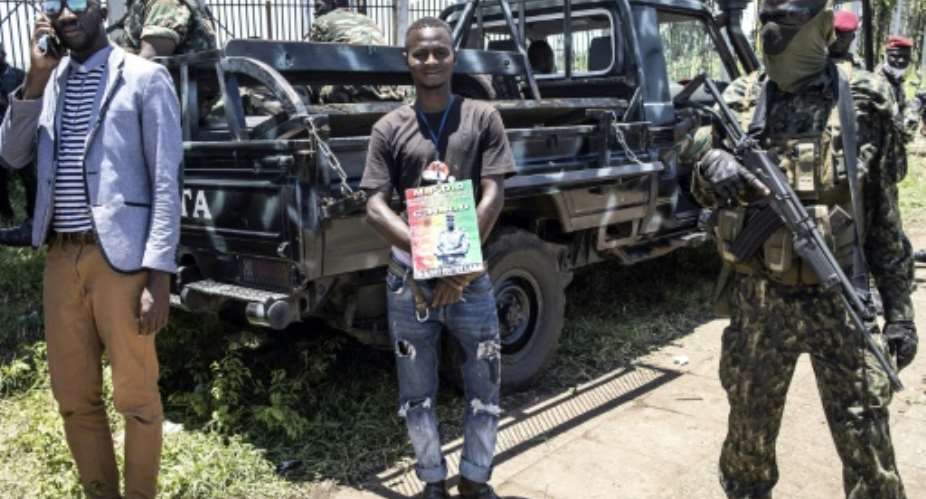Guinea's ruling military were due to open a four-day series of talks on Tuesday, intended to pave a return towards civilian rule after a putsch in the West African state.
The junta, which has come under intense diplomatic pressure since seizing power on September 5 from president Alpha Conde, was scheduled to talk to politicians and religious leaders on Tuesday.
It will then meet civil-society figures, diplomats, trade unionists and mining executives through to Friday.
Soon after seizing power, coup leader Lieutenant Colonel Mamady Doumbouya accused the Conde government of "trampling citizens' rights" and pledged to form a government of "national unity" that will guarantee a "transition".
But what exactly he has in mind remains unclear -- and there are questions about how long the military intends to cling to power.
On Tuesday, there was confusion in the capital Conakry as the talks were due to begin.
Dozens of politicians jostled to squeeze through a narrow door, guarded by soldiers, to enter the palatial parliament building in the government district.
The junta communicates with the outside world almost exclusively through terse statements announced on public television, by a spokesman wearing fatigues.
Jules Tolno, the head of the Guinean People's Party, told AFP that like most attendants, he had heard of the talks on television.
"Given the political situation, this is how it goes," he said.
Land borders reopening
The putsch came amid rising criticism in Guinea of Conde, 83, for his perceived authoritarianism, but nevertheless sparked broad international condemnation.
It raised fears about democratic backsliding in the region, following a similar coup in Mali last year.
West Africa bloc ECOWAS and the African Union suspended Guinea after the putsch. The United Nations, the European Union and the United States also condemned it.
Guinea's neighbours and trading partners, concerned about instability in the mineral-rich country, will be watching this week's consultation closely.
All of the country's main political parties -- including Conde's RPG party -- have said they will participate.
In a televised statement on Monday evening, the junta announced they would be reopening all of the nation's land borders from Wednesday.
Some had been shut after the coup, others before elections last year, officially for security reasons, a move that had caused diplomatic tensions with neighbouring countries.
The junta also said that a so-called draft charter on the transition will be drawn up at the end of this week's consultation.
Details remain scarce. It is not clear what form the transition government will take, nor how long it will last, nor what the role the military might play.
Similar neighbouring coup
Guinea's putschists quickly dissolved the government and the constitution after the coup.
That constitution had been at the centre of political tensions under Conde.
Last year, he pushed through a new version that allowed him to run for a third presidential term in October 2020.
The move triggered mass demonstrations in which dozens of protesters were killed. Conde won the election but the political opposition maintained the poll was a sham.
Parts of Conakry erupted in joy at news of the coup, with residents flooding the streets to applaud the army.
The junta subsequently released scores of political opponents detained under Conde, and in a sign of apparent good will, dismantled roadblocks across the capital.
But Guinea's current predicament has drawn parallels with its neighbour Mali, which has suffered two coups since August last year, led by Colonel Assimi Goita.
International condemnation was swift, with ECOWAS briefly imposing sanctions.
Mali's military committed to restoring civilian rule, under diplomatic pressure.
But over a year on, the army is still firmly in power in Mali and there are growing doubts about its promise to stage elections in February.





 Tuesday’s downpour destroys ceiling of Circuit Court '8' in Accra
Tuesday’s downpour destroys ceiling of Circuit Court '8' in Accra
 SOEs shouldn't compromise on ethical standards, accountability – Akufo-Addo
SOEs shouldn't compromise on ethical standards, accountability – Akufo-Addo
 Father of 2-year-old boy attacked by dog appeals for financial support
Father of 2-year-old boy attacked by dog appeals for financial support
 Jubilee House National Security Operative allegedly swindles businessman over sa...
Jubilee House National Security Operative allegedly swindles businessman over sa...
 Nobody can order dumsor timetable except Energy Minister – Osafo-Maafo
Nobody can order dumsor timetable except Energy Minister – Osafo-Maafo
 Mahama wishes National Chief Imam as he clock 105 years today
Mahama wishes National Chief Imam as he clock 105 years today
 J.B.Danquah Adu’s murder trial: Case adjourned to April 29
J.B.Danquah Adu’s murder trial: Case adjourned to April 29
 High Court issues arrest warrant for former MASLOC Boss
High Court issues arrest warrant for former MASLOC Boss
 Align academic curriculum with industry needs — Stanbic Bank Ghana CEO advocates
Align academic curriculum with industry needs — Stanbic Bank Ghana CEO advocates
 Election 2024: We'll declare the results and let Ghanaians know we've won - Manh...
Election 2024: We'll declare the results and let Ghanaians know we've won - Manh...
